With hugs and tearful farewells, hundreds of student activists who have occupied the Legislative Yuan for 24 days walked out of the legislative chamber yesterday into a cheering crowd who gave them a heroes’ welcome.
“Leaving the legislature and retreating from the legislative chamber was a very difficult decision to make, because we know that the expectations, responsibilities and pressures we will face after leaving the legislature will not be lower,” student leader Lin Fei-fan (林飛帆) told the protesters on the legislative floor before asking all protesters to leave the room.
“I would like to stress that leaving here does not mean that we are giving up or backing down. In fact, this movement for democracy that began on March 18 is a continuation of Taiwan’s history of resistance and the quest for freedom that has been ongoing for more than 100 years. We will continue the history and we will never back down or give up,” he added.
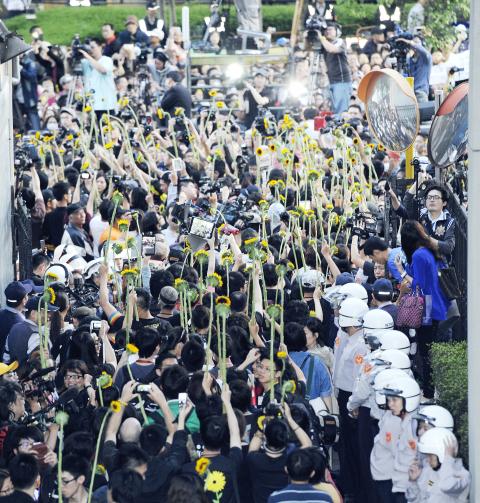
Photo: George Tsorng, Taipei Times
Lin said that after leaving the legislature, he and his partners planned to travel the country to connect with the approximately 500,000 people who took part in a demonstration on Ketagalan Boulevard in front of the Presidential Office Building on March 30.
“The 500,000 people are not just a number, and our next step is to go into different corners of the country to get to know these people,” Lin said. “The campaign is not over yet. We came with dreams in our minds and we leave with responsibilities on our shoulders.”
He also warned that if the Chinese Nationalist Party (KMT) broke the promise by Legislative Speaker Wang Jin-pyng (王金平) — to adopt legislation to monitor cross-strait agreements before reviewing the cross-strait service trade agreement — a bigger protest would be mobilized.
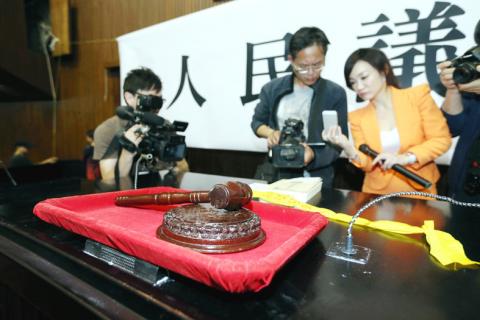
Photo: Chang Chia-ming, Taipei Times
“Occupation of the Legislative Yuan is only the preface to our action, the first chapter will soon start within civil society,” Lin said. “We will be back, we definitely will.”
“We will definitely meet again,” a group of students told each other as they hugged before leaving the legislative chamber, while others were busy cleaning up and restoring the chamber to its original state.
Another student leader, Chen Wei-ting (陳為廷), thanked all those who took part in the movement, regardless of their age, profession or background, while dismissing the media’s naming of the movement as a “student movement.”
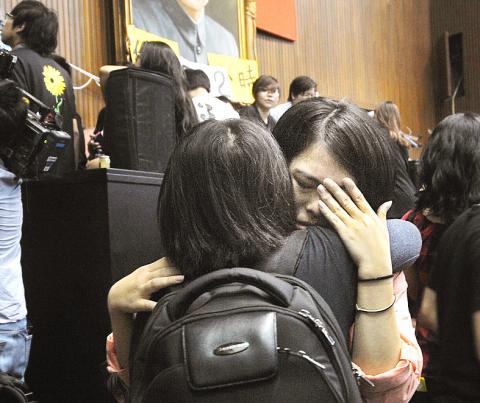
Photo: Fang Pin-chao, Taipei Times
“From the very beginning, this movement has not been a ‘student movement,’ as many people who are not in the movement define it. It is a movement that involves all citizens of this country, as well as many foreign residents living in Taiwan and Taiwanese living overseas,” Chen said.
He thanked medical personnel, lawyers and members of other civic groups, notably the Alliance of Referendum for Taiwan, for their support and help.
While many people made a distinction between protesters at the Legislative Yuan and those who once besieged the Executive Yuan on March 23, Chen said that those activists are also their partners and that the violent crackdown by the police against those people should be remembered.
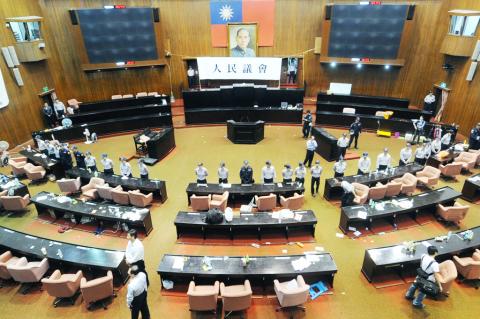
Photo: Lo Pei-der, Taipei Times
Besides clearing all the posters, slogans, banners, medical equipment, food and water from the legislative chamber and removing piles of chairs that blocked the chamber’s entrance, the students also returned the speaker’s gavel and placed it on the table in front of the speaker’s seat before leaving.
“Doing so is a symbolic gesture that we are now returning the legislative chamber to lawmakers,” a student said. “We hope that our lawmakers will, from now on, keep what the people want in their minds while formulating legislation.”
The students also left a classical satirical work, The Bureaucracy Exposed (官場現形記), on the table, with a note urging the legislature to adopt the promised monitoring legislation before reviewing the cross-strait trade pact and refrain from listening to President Ma Ying-jeou (馬英九), but listen to the public instead.
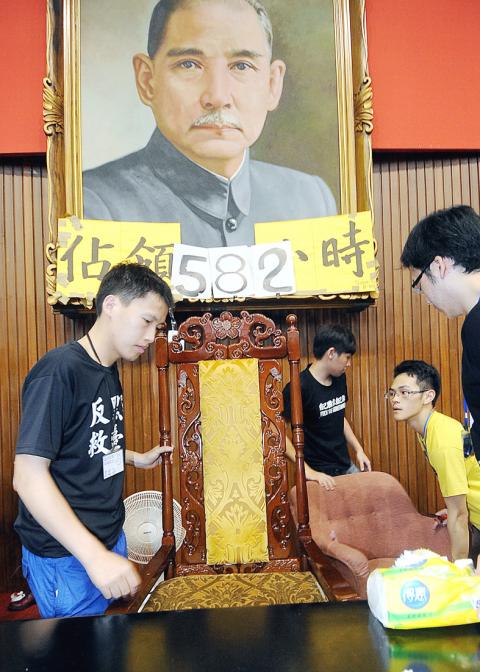
Photo: Fang Pin-chao, Taipei Times
Originally scheduled to deliver a speech, Lin and Chen left the rally before it ended at about 8:30pm.
After the rally, some still refused to leave, and as of press time, several civic groups, including the Alliance of Referendum for Taiwan, were still rallying outside the legislature, saying that they would wait to be evicted by police.
Meanwhile, shortly after the students’ departure from the Legislative Yuan, the National Police Agency ordered forensic investigators from the Taipei City Police Department’s Forensic Science Center to collect fingerprints from the legislative chamber.

Photo: Fang Pin-chao, Taipei Times
The agency also dispatched police officers from the Special Police Sixth Headquarters to surround and take over the legislature.
The move has raised speculations that the government might be planning to take legal action against the students.
Additional reporting by Chen Hsiao-yi

MAKING WAVES: China’s maritime militia could become a nontraditional threat in war, clogging up shipping lanes to prevent US or Japanese intervention, a report said About 1,900 Chinese ships flying flags of convenience and fishing vessels that participated in China’s military exercises around Taiwan last month and in January last year have been listed for monitoring, Coast Guard Administration (CGA) Deputy Director-General Hsieh Ching-chin (謝慶欽) said yesterday. Following amendments to the Commercial Port Act (商港法) and the Law of Ships (船舶法) last month, the CGA can designate possible berthing areas or deny ports of call for vessels suspected of loitering around areas where undersea cables can be accessed, Oceans Affairs Council Minister Kuan Bi-ling (管碧玲) said. The list of suspected ships, originally 300, had risen to about

DAREDEVIL: Honnold said it had always been a dream of his to climb Taipei 101, while a Netflix producer said the skyscraper was ‘a real icon of this country’ US climber Alex Honnold yesterday took on Taiwan’s tallest building, becoming the first person to scale Taipei 101 without a rope, harness or safety net. Hundreds of spectators gathered at the base of the 101-story skyscraper to watch Honnold, 40, embark on his daredevil feat, which was also broadcast live on Netflix. Dressed in a red T-shirt and yellow custom-made climbing shoes, Honnold swiftly moved up the southeast face of the glass and steel building. At one point, he stepped onto a platform midway up to wave down at fans and onlookers who were taking photos. People watching from inside

Japan’s strategic alliance with the US would collapse if Tokyo were to turn away from a conflict in Taiwan, Japanese Prime Minister Sanae Takaichi said yesterday, but distanced herself from previous comments that suggested a possible military response in such an event. Takaichi expressed her latest views on a nationally broadcast TV program late on Monday, where an opposition party leader criticized her for igniting tensions with China with the earlier remarks. Ties between Japan and China have sunk to the worst level in years after Takaichi said in November that a hypothetical Chinese attack on Taiwan could bring about a Japanese

STREAMLINED: The dedicated funding would allow the US to transfer equipment to Taiwan when needed and order upgraded replacements for stockpiles, a source said The US House of Representatives on Thursday passed a defense appropriations bill totaling US$838.7 billion, of which US$1 billion is to be allocated to reinforcing security cooperation with Taiwan and US$150 million to replace defense articles provided to the nation. These are part of the Consolidated Appropriation Act, which the US House yesterday passed with 341 votes in favor and 88 against. The act must be passed by the US Senate before Friday next week to avoid another government shutdown. The US House Committee on Appropriations on Monday unveiled the act, saying that it allocates US$1 billion for the Taiwan Security Cooperation Initiative